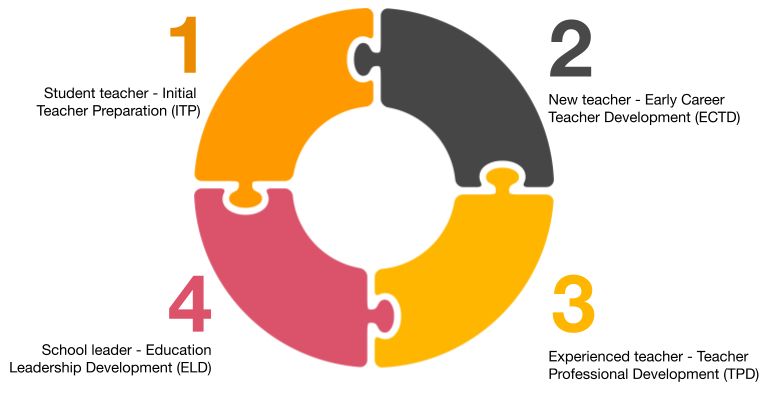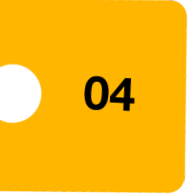Countries in the Middle East and North Africa (MENA) region place significant importance on the outcomes of students in K-12 (kindergarten to 12th grade) education. However, their performance on international indicators and rankings is yet to match this ambition. Education experts globally posit that teacher quality is critical to K-12 success (see page 7). So, how can we ensure that every student has access to outstanding teachers?
This report proposes a Teacher Development Framework for the MENA region to nurture impactful teachers. The framework builds on the four key stages of the teacher journey, from initial teacher preparation through to career and education leadership development. It identifies the activities that must be conducted and the development opportunities that need to be made available by national, regional, and local actors in the teacher development ecosystem. By using this framework, we can identify prevalent gaps and challenges within the ecosystem and along the journey, and propose targeted actions to stakeholders to address these issues.
We should note, of course, the vast diversity within the MENA region. The experiences of teachers will vary depending on whether they work in the government or private sectors and on the different political and economic contexts of each country. This thought leadership does not aim to generalise the experiences of teachers but to encourage further in-depth and holistic research into the teacher journey within each country.

Recognising the unique context of each country, we urge stakeholders such as ministries of education, quality assurance bodies, colleges of education, and schools to advocate for teacher quality by implementing this framework as a tool for:
Conducting an in-depth analysis of teacher experiences throughout their development journey
Performing a detailed assessment of the strengths and weaknesses within the teacher development ecosystem
Collaboratively building a unified and clear vision for teacher quality
MENA countries have ambitious goals for student outcomes
The MENA region is diverse, and a one-size-fits-all approach to educational reform is not feasible. However, countries in this region are united in their understanding of education's pivotal role in achieving economic objectives. With 55% of the population aged 30 and under, MENA governments are acutely aware of their responsibility to the younger generation. Education outcomes are a key focus in national strategies and wider plans for building globally competitive knowledge economies.
Efforts to enhance student outcomes in the MENA region have shown promise, such as increasing education budgets, updated curricula, prioritisation of STEM subjects, and the adoption of online learning as an agile response to COVID-19. However, despite these initiatives, all MENA countries still score below the 500 midway point in two key international assessments—the Progress in International Reading Literacy Study (PIRLS) and the Trends in International Mathematics and Science Study (TIMSS). To reach their goal of achieving above-average outcomes in these assessments, MENA nations will need to implement targeted, evidence-based policies, standards, and initiatives that address the fundamental issues affecting performance. So, what are these core issues, and how can they be effectively addressed?

Uncovering the barriers to student attainment
The issue of teacher quality in K-12 performance
When examining internationally recognised analyses and frameworks for K-12 success, the most commonly identified factors include:


John Hattie’s research on the major sources of variance in student achievement is frequently referenced – it suggests that teachers account for 30% of the variance in student achievement, while factors such as home, schools, and peers each contribute between 5% and 10%. Additionally, other studies suggest that outstanding teachers can improve their students' Programme for International Student Assessment (PISA) scores by an average of 53% compared to their counterparts with lower teaching quality for similar students.
**well supported and incentivised with a strong foundation in content and pedagogy
The importance of the educator is deeply rooted in the historical and cultural tradition of the MENA region. How then can we ensure that every young person has access to outstanding teachers? What might currently be inhibiting this?
“The single greatest effect on student achievement is not race, it is not poverty - it is the effectiveness of the teacher”
“إِذَا مَاتَ الإِنْسَانُ انْقَطَعَ عَمَلُهُ إِلاَّ مِنْ ثَلاَثَةٍ مِنْ صَدَقَةٍ جَارِيَةٍ وَعِلْمٍ يُنْتَفَعُ بِهِ وَوَلَدٍ صَالِحٍ يَدْعُو لَهُ” “When a person dies, their deeds come to an end except for three things: ceaseless charity; a knowledge which is beneficial, or a virtuous descendant who prays for him.”
“قُـمْ للمعلّمِ وَفِّـهِ التبجيـلا كـادَ المعلّمُ أن يكونَ رسولا أعلمتَ أشرفَ أو أجلَّ من الذي يبني وينشئُ أنفـساً وعقولا” “Arise to the teacher and give him/her reverence. The teacher is almost a messenger. Do you know who is more honourable than the one who builds and develops souls and minds?”
.png)
Outstanding teachers are shaped by their development journey. There are four key stages in this journey, each with their own set of risks
MENA countries have made significant progress in teacher development by establishing dedicated institutions, such as the Emirates College for Advanced Education (ECAE, established in 2007) in the UAE, the National Institute for Education Professional Development (NIEPD, established in 2021) in Saudi Arabia, and the Queen Rania Teacher Academy (QRTA, established in 2009) in Jordan.
While KSA, Jordan and Egypt collectively employ over 1.5 million teachers, there is a lack of comprehensive documentation on the unique development experiences and needs of these educators.
Number of teachers in the MENA region

Source: Official statistics and publicly available information
A teacher’s professional developmental journey begins long before their first job, continues throughout their career, and needs to be supported well beyond just the initial training phase. The career-long teacher development journey has four stages:

Each of these stages presents an opportunity to shape and build exceptional teachers. Education stakeholders worldwide can leverage these opportunities, but doing so requires a careful assessment of the challenges encountered at each stage of the journey.
In the region in particular, PwC Middle East’s research and a study of relevant literature can be summarised into a non-exhaustive list of the risk factors at each step of the teacher development journey.
Illustrative summary of top challenges commonly experienced by different MENA countries at each milestone along the teacher development journey (non-exhaustive)

A core challenge: Stakeholder fragmentation
There is much to learn from both regional and international success stories in mitigating the challenges of teacher professional development. Examples include, setting high entry requirements for ITP programmes, like in Finland, with acceptance rates between 10%-40%, or incorporating Singapore's rigorous two-year, six-step centrally-managed teacher induction programme and Australia’s three-step framework for designing effective personalised professional learning plans.
While identifying such good practice interventions is relatively straightforward, our experiences indicate that the implementation is extremely challenging if the educational ecosystem and its stakeholders are not well-organised and aligned.
Across the MENA region, a number of ecosystem challenges are frequently raised and the most common are:

Lack of coordination and alignment between stakeholders
There is often a disconnect between players, such as quality assurance bodies and schools, or between teacher recruiters and colleges of education. In a study for Qatar, focus group participants emphasised the lack of collaboration between the Ministry of Education and Higher Education (MoEHE) and the College of Education (CED) in making teaching an attractive profession.

Unclear roles and responsibilities
In KSA, for example, the mandate for licensing trainers is held by multiple entities, such as the Education and Training Evaluation Commission (ETEC), the Technical and Vocational Training Commission (TVTC), and NIEPD). This risks duplication of work and reduced accountability.

Inconsistent use of teacher standards and competencies
In KSA, for example, different frameworks are used by the Ministry of Human Resources and Social Development (MHRSD), the Ministry of Education (MoE), and ETEC. This overcomplicates and defocuses the teacher’s role.

Unclear teacher development objectives, causing limited impact tracking and realisation
Amina Eltemamy’s study of teacher leadership programmes in Egypt, for example, discusses fragmented teacher professional development initiatives with no clear vision or objectives. This has led to a supply of unqualified teachers and reduced trust in the profession.
At the root of these challenges is the fact that teacher development ecosystems are sizeable and involve many players. Stakeholders globally express concern about the fragmentation of their teacher development ecosystems and find them difficult to navigate.
Core stakeholders are fragmented along the teacher development journey

This puts the teacher development journey at risk of inconsistency and/or overcomplexity, which ultimately underserves the final beneficiary - the teacher.
It is crucial that the efforts of each player are supported by those responsible for other parts of the journey. For example, a ministry of education may design an excellent professional development programme, but if low ITP entry requirements mean the teaching workforce itself is not made up of motivated and passionate educators, then there will always be a limit to the impact the programme can make. A college of education may implement an exciting awareness and outreach campaign to change the perceptions of the teaching profession but if teacher salaries and working conditions remain subpar, there is little that can be changed.
This makes evident the need for collaboration and a shared vision between policymakers, regulators, training providers, schools, and teachers. Each of these stakeholders can be an advocate for a better teacher journey.

Tackling the core challenges: a winning combination
The Teacher Development Framework is a tool for ecosystem players to diagnose weaknesses, advocate for solutions, and manage stakeholders
The framework can be used to assess the strength of teacher development ecosystems and help stakeholders clearly visualise how the system works; where their roles start and end; where oversights may be prevalent, and how they can most effectively work together.
Informed by global best practices, the Teacher Development Framework sets out the overarching structure of a strong ecosystem across three levels, with the teacher journey at the centre.

At the outermost level (Education Sector Regulatory and Governance Setting), national regulators set national direction and economic priorities. At the second level (Educator Regulatory and Governance Setting), sectoral and regional authorities build the base that includes:
National educator strategy. Activities include developing national ITP, ECTD, TPD, ELD goals, KPIs, initiatives and workforce plans etc.
Standards and policies. Activities include developing coherent and aligned standards and policies for ITP, ECTD, TPD, ELD, teacher licensing, programme accreditation, recruitment and retention, performance management etc.
Operations and governance enablers. Activities include setting up and managing talent engagement platforms, teacher management systems, learning management systems, performance management systems, data analytics and reporting etc.
Continual Quality Assurance. Activities include monitoring, licensing, accrediting, evaluating the delivery of ITP, ECTD, TPD, ELD and the providers that deliver them.
Ecosystem players roles and responsibilities

At the innermost third level (Professional Practice and Learning) – for ITP, ECTD, TPD, and ELD – operators and providers conduct needs analyses, plan annual offerings, and design and develop programmes and assessments. They also conduct outreach and attraction activities; filter applicants, deliver programmes; assess and certify or qualify learners; and quality assure and evaluate their programmes. For schools in particular, the feedback and performance management process is also a key tool for teacher growth and development, particularly when personalised. Unless there is aligned and focused effort across all three levels, we believe the ecosystem is weakened and the teacher journey is at risk.
By mapping key players to this Teacher Development Framework, their roles and responsibilities become clearer. Countries can use the framework to help pinpoint which activities fall under which relevant party, then identify gaps, potential overlaps, and independence issues.
Way forward
To optimise investments in the development of current and future educators, the Teacher Development Framework and insights from this report can guide governments, training institutions, and schools to:
Conduct a comprehensive diagnosis of the strengths and weaknesses of their ecosystem;
Establish a cohesive and coherent vision for teacher quality; and
Conduct a detailed analysis of teacher experience throughout their development journey.
At different layers in the teacher professional development ecosystem, each stakeholder has a role to play. These roles can be analysed and understood using the framework to explore the following questions:

- Why: Do you have a clear strategic direction? Are your objectives with regards to teacher development well defined? How can the effectiveness of the ecosystem be assessed, and what mechanisms should be in place to ensure quality?
- Who: Is each player’s role clearly defined? Are they fulfilling their roles effectively? Are there any gaps, overlaps, or opportunities for collaboration?What role do you need to play to strengthen the ecosystem?
- What: Are your activities aligned with the rest of the ecosystem (national competency frameworks, policies and standards, systems and data etc.)? Are you carrying out all the activities required of you to deliver the best beneficiary experience?
Where: How evenly does the ecosystem operate? What gaps exist in certain regions and what special interventions may be needed to improve access?
- How: How can training programmes be aligned with curriculum goals and teaching methodologies to ensure maximum impact on student learning outcomes? How can you involve the different stakeholders (parents, students, and the broader community) in supporting and participating in teacher training and leadership development initiatives?
Investing in teacher training and leadership development represents not just an investment in educators, but in the future of education and society at large. By equipping teachers and school leaders with the necessary support and resources to excel, governments and schools can foster environments where every student has the chance to thrive.
At PwC, our Middle East Education and Skills Consulting Practice is passionate about our region achieving its goals towards strong education systems, empowered educators and thriving students. We know that the strength of a nation begins with the strength of its people, and among the first to nurture them are their teachers. Our hope is that this framework helps bring all stakeholders in the teacher development ecosystem one step closer to understanding and strengthening this foundation.








